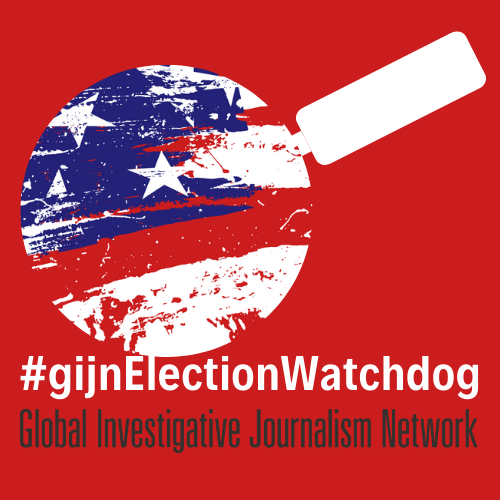
For the past seven weeks, a special GIJN project, #gijnElectionWatchdog, has provided reporters with tools to tackle the toughest US election stories. Many of these have been advanced or lesser-known apps for investigations into topics like campaign finance abuse and foreign interference.
Now, with just a few days remaining until a hugely consequential election — and possible chaos for weeks after — we share quick-reference tools that matter, recommended by our most-trusted experts, in this period for time-pressed journalists:
- Monitor officials: Check what each state’s top election official is focused on in real time. First Draft reporter Diara Townes has compiled a list of Twitter feeds for 47 of America’s 50 secretaries of state.
- Find Sources: Find and reach vetted election sources by category, language, and state in a great expert contacts database from the American Press Institute. Use the free Name2Email app to find other email addresses, or try inurl:staff or inurl:team in Google search.
- Visualize the whole election: If there is one resource to paste on your wall this week — especially if you’re a national reporter or newsroom — then this is it: Harvard Belfer Center’s D3P National Election Dataset presents all the main voting rules, factors, and timings for all 50 states in a single spreadsheet.
- Find evidence fast: To rapidly find evidence or witnesses for rumored incidents near polling stations, get the geocode from a pin on Google Maps, and paste the whole geocode link, without spaces, plus a comma and radius — like ,1mi — into TweetDeck. Add keywords like “polling” or “voting” or “intimidation”.

First Draft’s live 2020 dashboard surfaces messaging of major election disinformation concern in real time
- Check viral claims: Regularly check the trending posts of major disinformation concern on First Draft’s live election dashboard. To quickly find the right tool by disinformation category — whether it’s a suspicious video or TikTok post or Instagram image — check their dashboard breakdown.
- Flag militia crimes: In addition to rules for “poll watchers,” reporters need to know state laws restricting armed groups near polling stations this week. Georgetown’s Institute for Constitutional Advocacy and Protection has a new searchable resource laws governing militia activity for all 50 states.
- Check recount rules: Timelines for vote canvassing and recounts are different for each US state. The National Association of Secretaries of State created an easy-to-understand list of deadlines and conditions for county officials, local election boards, and secretaries of state for all 50 states.
- Monitor police chatter: Track crisis incidents near polling stations in real time with a police and EMS radio scanner apps like OpenMHZ or 5-0 Radio Pro. Flag any evidence of inappropriate law enforcement support for voter intimidation activity.
- Monitor reporters’ threads: Check on what the best election reporters in each state are covering or concerned about over the election period. The Fix compiled a list of leading political reporters to follow in each state in this Twitter list.
- Keep safe: Find guides and resources for your personal safety on CPJ’s #PressSafety2020 page.
- Game plan: Ahead of November 3, worthwhile weekend reading includes API’s election scenarios planning guide, and the University of Washington’s guide on the political maneuvers and misinformation that newsrooms can expect on and after election day, and strategies and tools to respond.
- Know the AP process: With so many threats of challenges, disinformation, and even violent responses to results declared by media prior to official certification weeks later, understanding how the Associated Press Decision Desk will call all 7,000 races will be important to know, and to report. Check out their explainer.
- Have the electors dataset in the bottom drawer: For the “nightmare scenario” in which a party might seek to use friendly swing state legislatures to replace electors in order to contradict counted vote results — likely based on false voter fraud claims — find the names of those battleground electors from the Excel file within this story compiled by Journalist’s Resource.
For more on essential election resources, see GIJN’s Field Guide for Journalists on the Front Lines and the #gijnElectionWatchdog Twitter feed.
 Rowan Philp is a reporter for GIJN. He was formerly chief reporter for South Africa’s Sunday Times. As a foreign correspondent, he has reported on news, politics, corruption, and conflict from more than two dozen countries around the world.
Rowan Philp is a reporter for GIJN. He was formerly chief reporter for South Africa’s Sunday Times. As a foreign correspondent, he has reported on news, politics, corruption, and conflict from more than two dozen countries around the world.
